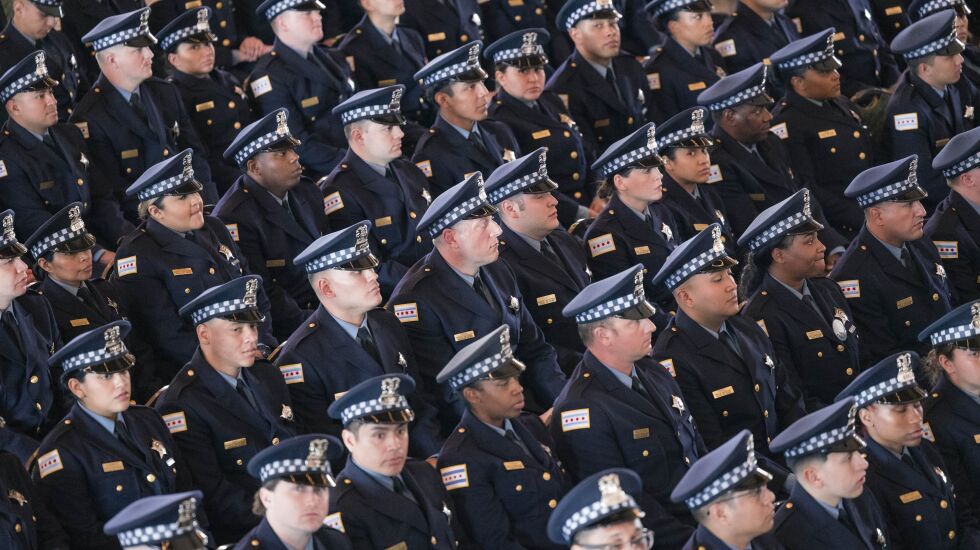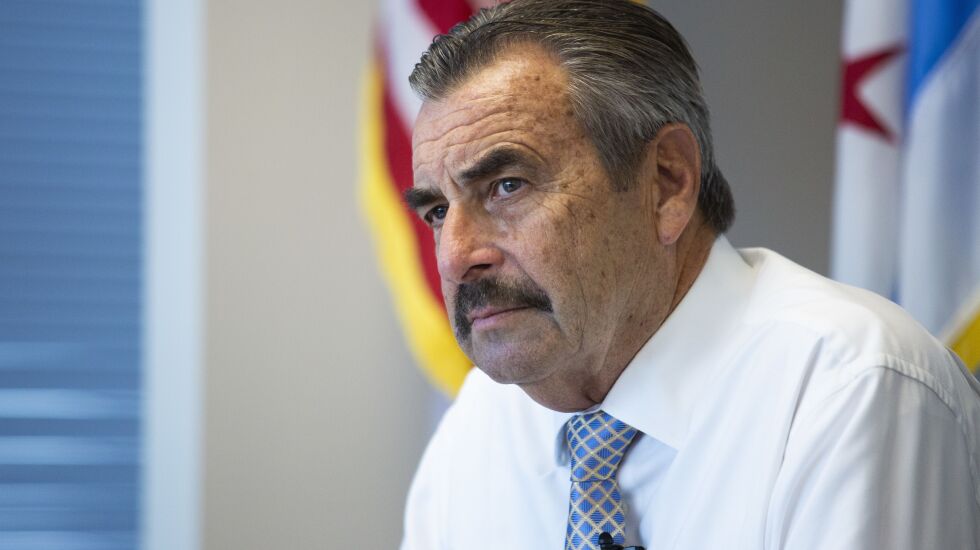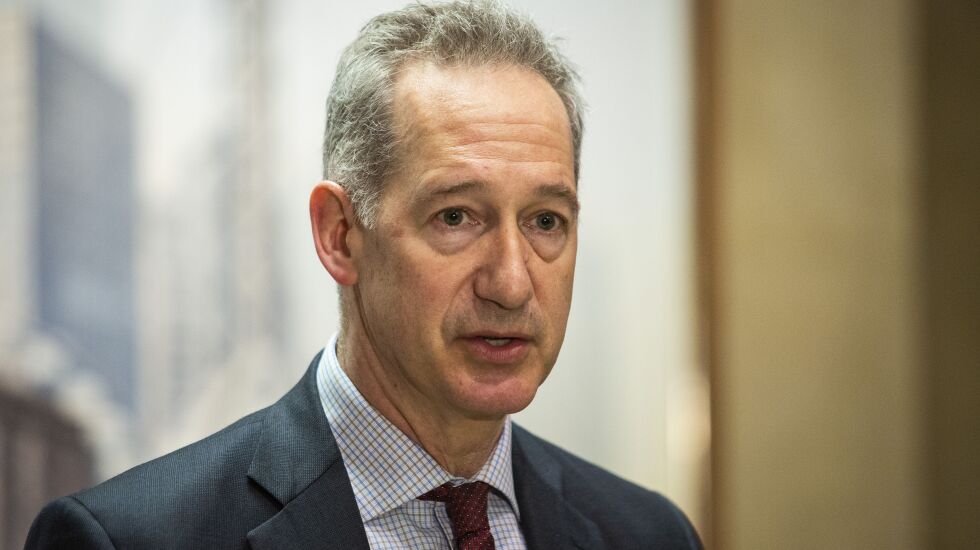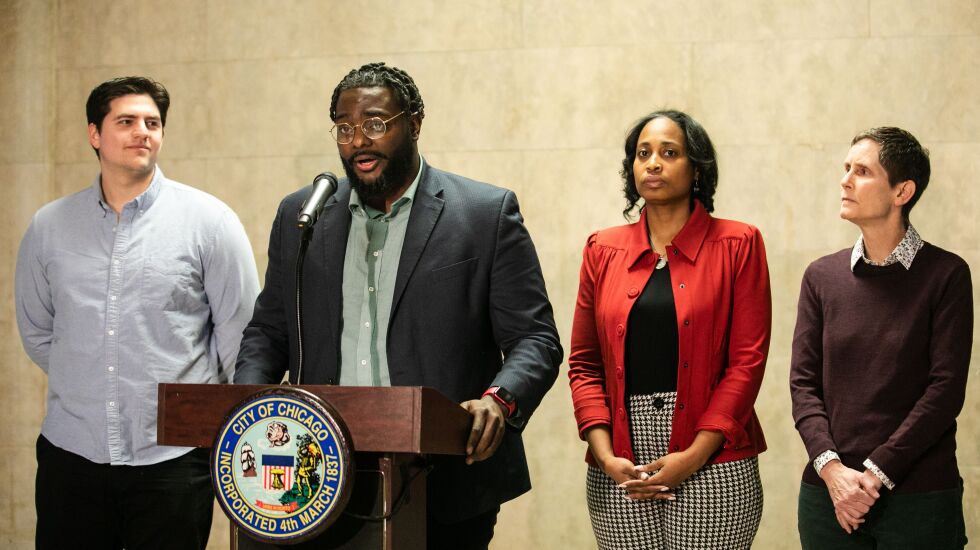
Mayor Brandon Johnson will soon be on the 30-day clock to make the most important appointment that any Chicago mayor can make — a choice that could define his tenure and even how long he remains in office.
The Community Commission for Public Safety and Accountability will hold an executive session at 3:30 p.m. Thursday to discuss background checks on the six semifinalists for Chicago Police Department superintendent, then choose three finalists from among those names.
After the executive session, the commission’s public meeting is at 6:30 p.m. in the auditorium of Kennedy-King College, 740 W. 63rd St., to take a formal vote on the three finalists.
Once Johnson gets those names, the clock starts ticking. The new mayor will have 30 days to either choose one of those finalists or reject them all and ask for another nationwide search that produces three more names.
The latter scenario is viewed as highly unlikely.
“That’s part of the statute, so that option exists. [But] the goal is to operate in good faith. Take the work done by the commission, review the dossiers on the candidates, engage with the candidates and assess them on the criteria,” said senior mayoral adviser Jason Lee.
“If that assessment finds that there’s a candidate within the three that were presented that meets the criteria, then that person will be hired,” said Lee. “From everything I hear, folks worked really hard. They were really thorough. They took it very seriously. And that’s all you can ask.”
On June 29, the Chicago Sun-Times reported that a list of 53 applicants vying for the top cop job had been whittled to six, including five police department veterans and an outsider who previously worked for Chicago’s Civilian Office of Police Accountability.
Advancing to the background check phase of the nationwide search were: Counterterrorism Chief Larry Snelling; his now-retired predecessor, Ernest Cato III; Street Deputy Migdalia Bulnes; Constitutional Policing and Reform Chief Angel Novalez; Labor Relations Cmdr. Donna Rowling; and Shon Barnes, the police chief in Madison, Wisconsin, who spent about a year as director of training and development for COPA.
Snelling and Novalez are widely viewed as favorites to make the top three. Cato could make it, but Barnes has a chance to edge him out, some experts believe. Snelling, Cato and Barnes are African American. Novalez is Latino.
Charlie Beck, a former Los Angeles police chief, was brought in to hold down the fort at the police department after Mayor Lori Lightfoot fired Chicago Police Supt. Eddie Johnson in December 2019 and before she chose retired Dallas police chief David Brown as Johnson’s permanent replacement.
Beck reviewed the finalists and told the Sun-Times on Wednesday there are “some in there that stand out above the others.”
“I’m hoping one of those gets selected,” Beck said, refusing to pinpoint his favorites.

“They need a visionary leader. Somebody [who] can see where the organization needs to go and lead it that way, rather than just deal with the daily crisis, which there will always be,” Beck added. “You need an intelligent game plan. And you need to lead toward it every day.”
Former longtime Inspector General Joe Ferguson knows most, if not all, of the semifinalists and considers all of them “capable of the job.” But, he argued, the six-person list “does not include some of the best available nationally, which a world-class city or a city aspiring to be world-class” needs and deserves.
Ferguson blamed “the politics that played into” the early part of the search process.
“Public hearings ... for community input were largely hijacked by individual efforts to promote a specific candidate, rather than speaking to what it is that we’re looking for in the next superintendent,” Ferguson told the Sun-Times.
To applicants from outside Chicago, “that sort of politicking ... confirms that Chicago is what Chicago’s reputation is nationally. And it also leaves you ... feeling, no matter what, I’m playing at a disadvantage because I do not have the capacity to mount any sort of inside politics campaign here,” he said.
Above all, Ferguson said, Johnson must choose a superintendent with humility.
“The challenges are beyond the capacity of any one person, both internally and also in terms of the external landscape, which you can’t control at a time when we are lacking in leadership from the other components of the political and criminal justice system,” Ferguson said.
“So you need to have the confidence to manifest humility in the notion that you don’t have all the answers, but you are going to acknowledge the deficits [and] bring in the expertise, because that’s what humility does,” said Ferguson. “It says, ‘I don’t have an answer for this. I’m not gonna make up an answer. I’m gonna bring in people who have answers to this piece and that piece. We’re gonna try it. And when it doesn’t work well, we’re gonna acknowledge it and we’re going to reset.’ All of those things are rooted in a fundamental humility.”

The public safety section of Johnson’s 223-page transition report reinforces his promise to eliminate the police department’s error-filled gang database and cancel the ShotSpotter contract — presumably after the $10 million extension of the controversial gunshot-detection software he inadvertently authorized.
The report also recommends hiring 50 detectives every quarter; conducting a workforce allocation study that develops a mathematical model for assigning officers after analyzing 911 calls; considering staffing requirements to speed compliance with a federal consent decree; and identifying “opportunities for alternate civilian response that could relieve demands for police time and resources.”
The public safety section also recommends that the new superintendent develop “aggressive goals around shooting and homicide reduction” and that police supervisors “randomly review body cam footage” and other sources of video to evaluate community interactions.
The report calls for Johnson to “end the practice of using arrests, stops, ticket citations and positive community interactions or investigatory stop reports to evaluate officer productivity.”
Shuttered and neglected buildings should be turned into “safe havens for survivors of violence,” the report states. Shuttered mental health clinics should be reopened and offer expanded access to trauma and mental health care. Until then, “24-hour walk-in service” should be offered at the city’s three remaining mental health clinics, according to the report.
“Many people who commit violence are survivors of it. We offer strategies to help people in communities heal in the aftermath and build back stronger,” said public safety chair Kathryn Bocanegra.
Ferguson said that’s all well and good.
Above all, he said, Chicago’s new, $260,004-a-year police superintendent must “articulate from a place of experience and knowledge and identity with rank-and-file officers the case for why the consent decree is something that’s good for everybody” as a “platform for community-based policing.”

That message must be delivered “in a somewhat public way so the public immediately sees there is going to be a different order from the past,” Ferguson said.
“One of the most concerning things on the public safety front is that there is not even acknowledgement out of City Hall of the magnitude of the problem today. Root causes are absolutely critical as part of a larger vision for public safety. But in the meantime, lives are being lived. Lives are being lost. They are mostly Black and Brown lives that are being lost. That is not being acknowledged,” Ferguson said.
“An incoming superintendent has to carry with him the authority and the support of a mayor to make the case for the size of the department and the deployment approach and strategies that are needed to address crime now and do it in a way that actually makes the case to the officers themselves that this, too, is what they want,” he said.
Being the “change agent” Chicago desperately needs will not be easy, but it’s also a “great opportunity,” said Beck, a self-defined “optimist by choice.”
“I just hope that we can capitalize on it,” he said.
Brown lasted three years before he was chewed up and spit out by violent crime, his ever-changing approach to reducing it and by Chicago’s unique brand of insider politics.
Beck can only hope that “very short life span” changes with Chicago’s new top cop.
“That’s not a good thing. That doesn’t bode well. People need to understand that that’s why it’s important to support the person who is selected,” Beck said. “You want them to be able to succeed, and they’re gonna have to be in that seat for a while to do that, no matter who it is. You can’t just wave a wand and change 200 years of history.”







